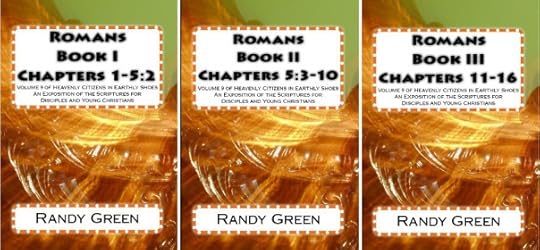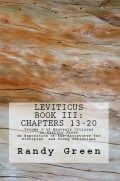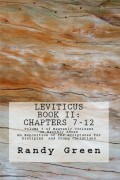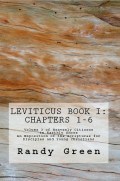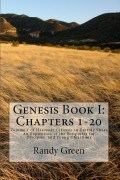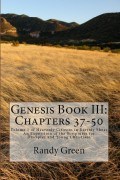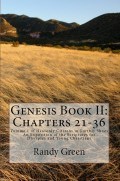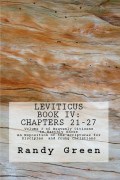Randy Green's Blog, page 357
October 26, 2015
Double-edged Attorney – Part 3
HOT OFF THE PRESS!!! Romans: Volume 9 of Heavenly Citizens in Earthly Shoes is now available from CreateSpace (paperbacks) and Kindle (eBooks). Click on the link to the right of this page to go to Amazon and place your order.
Therefore, He had to be made like His brethren in all things, so that He might become a merciful and faithful high priest in things pertaining to God, to make propitiation for the sins of the people. For since He Himself was tempted in that which He has suffered, He is able to come to the aid of those who are tempted [Hebrews 2:17-18].
We’ve been enthralled the past couple of studies by the courtroom theatrics of D.A. Dudley Adversary and Defense Attorney Yen Actlike. The Honorable Blindside Barabbas got into the act too.
But sorry. We must now switch channels to watch an even better courtroom scenario. This is necessary so that we can learn how all of this applies to our Bible verses. I do apologize though. I didn’t mean to yank the show in midseason and leave you hanging.
Our Bible verses afford us a panoramic view of a courtroom in eternity. Off in the distance we can see Judge Theos sitting on His judge’s bench with gavel in hand. Standing there in front of Him is that disgusting ogre, D.A. Diabolos, bringing countless charges against a good deal of mankind.
Not to worry though. In our corner is Defense Attorney Yeshua HaMashiach, the renowned Israeli world champion. He will have a thing or two to say about El Diabolos’ infernal lies.
How does this relate to our Bible verses? It’s like this. Jesus is God’s great High Priest, given to stand before the eternal throne and defend every person who comes to Him to live. Let’s examine how this is so, as it is presented in Hebrews 2:17-18.
In verse 17 we are taught that Jesus was 100% perfect humanity, just like you and me, sin excepted. That is the significance of the words “made like His brethren in all things”. The eternal Son of God took upon real humanity. He became one of us, while still remaining fully God. He is the God-man. He is not a hybrid of the two natures, nor is He God with an appearance of flesh and blood. He was made like us “in all things”.
The reason He fully became one of us is expressed in the words “so that He might become a merciful and faithful high priest in things pertaining to God, to make propitiation for the sins of the people”. Jesus’ ministry as the God-man was to be God’s high priest on behalf of sinful man.
To adequately fulfill His ministry, Jesus had to be both a merciful high priest and a faithful high priest. A high priest’s functions had to do with “things pertaining to God”. God chose His priests. No one was ever permitted to take this honor unto himself. God had to appoint him to the ministry.
His duties were to do the things God required of him, not to make up his own rules and regulations. His role was to “make propitiation for the sins of the people”. This means he had to appease God, Who was angered over the violations of His Law by sinful man. This is an excellent example of how the high priest’s functions had to do with “things pertaining to God”.
Wow! Already our time is up! We will conclude this topic on the morrow. For now we are privileged to learn from our Lord Jesus. May the Holy Spirit imbue His teaching into our heads and hearts.
To further research this issue, I direct you to my book Leviticus: Volume 3 of Heavenly Citizens in Earthly Shoes. To purchase my books please go to:
http://www.amazon.com/Randy-Green/e/B00507WC86
Filed under: Church Age Tagged: attorney, courtroom, defense attorney, district attorney, God-man, Hebrews 2, high priest, judge, lawyer, priest








October 25, 2015
Double-edged Attorney – Part 2
HOT OFF THE PRESS!!! Romans: Volume 9 of Heavenly Citizens in Earthly Shoes is now available from CreateSpace (paperbacks) and Kindle (eBooks). Click on the link to the right of this page to go to Amazon and place your order.
Therefore, He had to be made like His brethren in all things, so that He might become a merciful and faithful high priest in things pertaining to God, to make propitiation for the sins of the people. For since He Himself was tempted in that which He has suffered, He is able to come to the aid of those who are tempted [Hebrews 2:17-18].
The Honorable Blindside Barabbas sits at the judge’s bench, presiding over the two prima donnas who occupy the attorneys’ chairs. The defense prima donna, er, I mean the defense attorney, is Mr. Yen Actlike, while the district attorney is Mr. Dudley Adversary. Attorney Actlike’s client is Ms. Chastity, yes, none other than the sweet and innocent Ms. Chastity, one and the same.
As is customary with all “innocent until proven guilty” societies, the D.A. has to present his case first. Either he proves beyond a reasonable doubt that Ms. Chastity did the foul deed, or else Ms. Chastity doesn’t even have to prove her innocence. The only thing she need do is adequately dispute Dudley Adversary’s evidence if need be. And that is Yen Actlike’s job anyway, not Ms. Chastity’s.
So D.A. Adversary goes first.
If it please the court, I’d like to request an adjournment for a month or so.
To which Mr. Actlike responds,
Objection, Your Honor. This is a delaying tactic because no real evidence exists to support the charges against my client.
Dudley Adversary doesn’t take too kindly to the insinuation and retorts with vehemence,
Oh, yea. What do you call the photos of Ms. Chastity holding the smoking gun while standing over the warm corpse, you shyster you?
He shouldn’t have spoken so harshly to Attorney Actlike. Now ol’ Yen’s dander was up, and was he riled. He countered,
And seeing that no substantive evidence exists to support the charges against my client, I move to dismiss.
Judge Barabbas gets into the act. Rapping his gavel on the judge’s desk, he thunders,
Both attorneys make excellent points. Court is both adjourned for several months, and the case is dismissed due to the lack of evidence! So go home and watch my TV show.
Didn’t I caution you at the conclusion of the last study not to miss out on this exciting court case. Have you ever witnessed such a sterling display of jurisprudence by a judge? Did two attorneys ever go at it any better than Yen Actlike and Dudley Adversary?
Oh, but we must go to commercial break at this time. We will meet back here same time, same channel, tomorrow. See you then, and see Jesus now.
To further research this issue, I direct you to my book Leviticus: Volume 3 of Heavenly Citizens in Earthly Shoes. To purchase my books please go to:
http://www.amazon.com/Randy-Green/e/B00507WC86
Filed under: Church Age Tagged: attorney, courtroom, defense attorney, district attorney, God-man, Hebrews 2, high priest, judge, lawyer, priest








October 24, 2015
Double-edged Attorney – Part 1
HOT OFF THE PRESS!!! Romans: Volume 9 of Heavenly Citizens in Earthly Shoes is now available from CreateSpace (paperbacks) and Kindle (eBooks). Click on the link to the right of this page to go to Amazon and place your order.
Therefore, He had to be made like His brethren in all things, so that He might become a merciful and faithful high priest in things pertaining to God, to make propitiation for the sins of the people. For since He Himself was tempted in that which He has suffered, He is able to come to the aid of those who are tempted [Hebrews 2:17-18].
The famous criminal defense attorney Yen Actlike has a new client. Of course the client is accused of first degree murder. Actlike wouldn’t waste his time or talent on anything less. So the client comes to Actlike’s office to enumerate the facts of the case to his attorney.
I am fabricating this case, so don’t try finding it to watch on the internet. The client is Ms. Chastity. She could never do the dastardly deed she is accused of…even if she had the smoking gun in her hand.
Leave it to Actlike to get her off. He’ll probably prove the bullet holes in the victim’s head are really snake holes. The victim was killed by a brood of vipers, not by bullets from Ms. Chastity’s gun. Anyway, that’s Actlike’s interpretation of the facts, and he is determined to sell it to the twelve arbiters who comprise the jury.
Across the aisle sits the country’s most famous D.A., a certain Mr. Snidely Whiplash. Scratch that. The dude is already taken. He is the arch villain who makes life miserable for the Royal Canadian Mounted Policeman, Dudley Do-Right. So we’ll name our D.A. Dudley Adversary.
Well, D.A. Adversary isn’t intimidated by Actlike’s reputation. He has a few tricks up his own sleeve. According to him, a smoking gun is a smoking gun. And that resolves the matter. It is the sum total of whatever evidence might be required to convict.
Mr. D.A. Adversary once saw another attorney say, “If the glove doesn’t fit, you must acquit.” So he decided to borrow the parlor trick for use in his own case. Actlike wasn’t about to pull the wool over the eyes of his jurors, you see.
So Mr. D.A. Adversary pronounced in their hearing, “If the gun is smoking, you must be joking!” He couldn’t figure why all the jurors had dropped jaws and blank stares on their faces. Apparently the lights were on but nobody was home…not with the jurors, mind you, but with the good D.A. Adversary. Actlike should expect a slam dunk.
Sitting in the magistrate’s chair and wielding his gavel was the most notable judge this side of heaven, the Honorable Blindside Barabbas. He would brook no shenanigans in his courtroom, he wanted both attorneys to know…even though he only looked at Actlike when he threatened reprisals.
On the morning of the trial everyone is present in the courtroom, everyone, that is, except the Honorable Blindside Barabbas. He was in the wing, awaiting his summons by the court bailiff. Suddenly the bailiff’s voice echoes through the room and into the judge’s chambers,
Hear ye! Hear ye! The Honorable Blindside Barabbas’ courtroom is called to order. His Honor is about to make his entrance. Stand and salute him, one and all!
This is about to get good, dear friends. Be sure to return after the commercial break, or rather, tomorrow. It is now time to visit with the Lord Jesus a bit.
To further research this issue, I direct you to my book Leviticus: Volume 3 of Heavenly Citizens in Earthly Shoes. To purchase my books please go to:
http://www.amazon.com/Randy-Green/e/B00507WC86
Filed under: Church Age Tagged: attorney, courtroom, defense attorney, district attorney, God-man, Hebrews 2, high priest, judge, lawyer, priest








October 23, 2015
That’s Just Perfect! – Part 4
HOT OFF THE PRESS!!! Romans: Volume 9 of Heavenly Citizens in Earthly Shoes is now available from CreateSpace (paperbacks) and Kindle (eBooks). Click on the link to the right of this page to go to Amazon and place your order.
But we do see Him who was made for a little while lower than the angels, namely, Jesus, because of the suffering of death crowned with glory and honor, so that by the grace of God He might taste death for everyone. For it was fitting for Him, for whom are all things, and through whom are all things, in bringing many sons to glory, to perfect the author of their salvation through sufferings [Hebrews 2:9-10].
We ended our last study on a most holy topic, the two natures of Jesus the God-man. Let’s continue this discussion now.
The eternal Son of God was never created or made. He created all things, but He Himself always is. He is the plumb line by which everyone and everything else is measured. Jesus, on the other hand, is not the eternal Son of God: He is both God and man. Jesus is the name of the God-man, not the name of the eternal Son of God.
The eternal Son of God cannot die: He is God! In order to die for mankind’s sins, the eternal Son of God had to become a man. As a man He could die: as the eternal Son of God He cannot die. This is a profound mystery of eternity—even more, a mystery of the very nature of God and, more specifically, of the two natures of the God-man.
It would be dangerous for us to try to explain too much about the issue. We can only know what the Lord reveals about it to us in His Word. Even then we are limited in our understanding by our finite nature. Our Bible verses intimate the truths we are discoursing about, but the verses don’t set before us a complete unfolding of all the details.
The purpose of our study is to mine the ore of the topic about being “made perfect”, or being “perfected”. This is a much more limited attempt at understanding than is the topic of the two natures of Jesus the God-man. The Bible is written to teach us everything we need to know for a life of godliness, not to satisfy our every curiosity about eternity and the things of God.
Our two Bible verses are quite admirably divided into two sentences. Verse 9 is about Jesus, but verse 10 is about God the Father. Read the verses again, slowly please…no, more slowly than that. Ah, that’s better. Jesus is specifically identified as the subject in the first sentence, as you can see.
The second sentence distinguishes between Jesus and the One who “perfected” Jesus. This other One is identified in the first sentence as “God”. God is the One “for whom are all things, and through whom are all things”. This means He is the Creator. We know that much from Genesis 1.
Well, God is the One “bringing many sons to glory”. How did God do this? John 3:16 answers the question:
For God so loved the world, that He gave His only begotten Son…
Jesus did the dying, but God the Father did the giving, you see. And in bringing salvation to mankind (“bringing many sons to glory”), God the Father made “perfect the author of their salvation through sufferings”. This author of man’s salvation is none other than Jesus the God-man.
We already explained what it means for Jesus to be “made perfect” or “perfected”. The eternal Son of God took upon humanity to die for the sins of mankind. This was done “through sufferings” on the cross. When Jesus achieved the purpose for which He was made a man, He was “made perfect” or “perfected”.
Let’s savor this delectable morsel of spiritual truth. I hear there is a fine dining table in the prayer closet. Let’s make use of it now. Thank you, Jesus, for Your Word. Amen.
To further research this issue, I direct you to my book Genesis: Volume 1 of Heavenly Citizens in Earthly Shoes. To purchase my books please go to:
http://www.amazon.com/Randy-Green/e/B00507WC86
Filed under: Church Age Tagged: completed, cross of Christ, crucifixion, God-man, Hebrews 2, humanity of Jesus, Jesus, perfected, Son of man








October 22, 2015
That’s Just Perfect! – Part 3
HOT OFF THE PRESS!!! Romans: Volume 9 of Heavenly Citizens in Earthly Shoes is now available from CreateSpace (paperbacks) and Kindle (eBooks). Click on the link to the right of this page to go to Amazon and place your order.
But we do see Him who was made for a little while lower than the angels, namely, Jesus, because of the suffering of death crowned with glory and honor, so that by the grace of God He might taste death for everyone. For it was fitting for Him, for whom are all things, and through whom are all things, in bringing many sons to glory, to perfect the author of their salvation through sufferings [Hebrews 2:9-10].
We ended our last study by defining the Biblical usage of the term “perfect” or “perfected”. When someone matures or reaches the stage where he accomplishes the purpose for which he was made, then he is said to be “perfect” or “perfected”.
Our Bible verses quoted above are about Jesus. Let us understand that the name “Jesus” was given to the eternal Son of God at a point in time when He took upon real humanity and became a man. Now Jesus is the God-man. Before He took upon humanity, however, Jesus didn’t exist. The eternal Son of God always exists, but the God-man Jesus began circa 7 B.C.
In taking upon humanity Jesus “was made for a little while lower than the angels”, as Hebrews 2:9 phrases it. This is an allusion to the eternal Son of God becoming a man.
The purpose for Jesus doing this is worded “so that by the grace of God He might taste death for everyone”. We cannot fail to recognize the reference to the cross of Christ in those words. The purpose for the eternal Son of God becoming a man—all the while remaining the eternal Son of God—was to enable Him to die on the cross.
Even more, His death on the cross was to “taste death for everyone”. Jesus’ crucifixion was the payment for the penalty of sins for all mankind. That should be palpable from those words. The wages of sin is death, and all have sinned. Ergo, everyone must die. Jesus died everyone’s death so that everyone might live His life.
Now let’s observe the words “Jesus, because of the suffering of death crowned with glory and honor”. God the Father crowned Jesus the Son with glory and honor because Jesus the Son suffered death on behalf of everyone. That is the teaching to be culled from those words.
We read the same teaching by the Apostle Paul in Philippians 2:5-11. You would do well to turn in your Bible to that passage and prayerfully read the teaching as it is presented there.
The reason God the Father crowned Jesus with glory and honor was because Jesus died everyone’s death as payment for the penalty of everyone’s sins. In other words the eternal Son of God had a purpose for taking upon humanity, and it was to pay the penalty for the sins of all mankind.
When Jesus did so, He achieved the purpose for which He was made, viz., to pay the penalty for sins. This is another way of saying that Jesus was “made perfect” or was “perfected”. The eternal Son of God wasn’t “made perfect” or “perfected”. Jesus the God-man was.
This is deep theological truth, dear friends. We are standing on holy ground, when we discuss this topic. We need to stop and sit before the Lord Jesus now. Allow Him to prepare us to continue this journey in our next study.
To further research this issue, I direct you to my book Genesis: Volume 1 of Heavenly Citizens in Earthly Shoes. To purchase my books please go to:
http://www.amazon.com/Randy-Green/e/B00507WC86
Filed under: Church Age Tagged: completed, cross of Christ, crucifixion, God-man, Hebrews 2, humanity of Jesus, Jesus, perfected, Son of man








October 21, 2015
That’s Just Perfect! – Part 2
HOT OFF THE PRESS!!! Romans: Volume 9 of Heavenly Citizens in Earthly Shoes is now available from CreateSpace (paperbacks) and Kindle (eBooks). Click on the link to the right of this page to go to Amazon and place your order.
But we do see Him who was made for a little while lower than the angels, namely, Jesus, because of the suffering of death crowned with glory and honor, so that by the grace of God He might taste death for everyone. For it was fitting for Him, for whom are all things, and through whom are all things, in bringing many sons to glory, to perfect the author of their salvation through sufferings [Hebrews 2:9-10].
My brand spanking new car wouldn’t even start. It was all of three hours old, and all the engine could do was groan and moan and kick the bucket. So I hied off to the car dealer to give him a piece of my mind…a big piece!
The dealer asked for clarification. He wanted to know what the problem was. So I painted him a picture of that entire afternoon. He looked at me for a moment, scratched his head, then retorted,
I still don’t see the problem, son. The air conditioner works fine, doesn’t it? And the radio plays sweet tunes. The tires are inflated properly, and the gas tank is full. You can run the automobile for hours and listen to the radio in air conditioned comfort, all to your little ol’ heart’s content. And all your friends will be impressed. So what more could you ask for? You are a strange one, sir.
Huh? Are we missing something here? Did we just pass into the Twilight Zone? The Beatles “Yellow Submarine” made more sense than the car salesman! One would think his name was “Lucy in the Sky with Diamonds” and he lived on Boulevard Strawberry Fields Forever.
You see, no one pays big bucks for an automobile, just so he can sit in air conditioned comfort and hear a fantastic stereo system. For that we buy a home stereo setup. We buy a car so we can drive to different places. The engine is primary. The stereo and A/C are extras. (By the way, I made this up. No car salesman would be so inept.)
In Biblical terminology we would say that the imagined automobile I purchased was not “perfected”. It didn’t serve the purpose for which an automobile is manufactured. That is the real meaning in Scripture for being “perfect” or “complete”. It doesn’t have to do with moral issues, with sinlessness and holiness. It refers to something attaining to the purpose for which it was made.
Allow me to cite a Biblical example to illustrate. The Lord prophesied through Isaiah that He would raise up Cyrus king of Persia to put the hurting to Babylon. Cyrus was a heathen king who ruled a heathen empire. Yet the Lord arranged history so that Cyrus accomplished God’s work. When Cyrus did what the Lord foretold he would do, Cyrus was “perfected”. No, this heathen king wasn’t sinless or holy; but he was “perfected”.
In the same vein we read in our Bible verses today of another Person being “perfected”. As Cyrus king of Persia was “perfected”, so too in the case of the Person in our Bible verses: He wasn’t less than “perfect” and somehow became “perfect”, not in the sense of being imperfect or sinful and then becoming sinless. He was “made perfect” though.
This concept is absolutely essential for us to get solidified in our noggins, if we are to rightly understand the Scriptures. We will attempt a right understanding of them in our next study. For now let’s visit with our Lord Jesus and learn from Him.
To further research this issue, I direct you to my book Genesis: Volume 1 of Heavenly Citizens in Earthly Shoes. To purchase my books please go to:
http://www.amazon.com/Randy-Green/e/B00507WC86
Filed under: Church Age Tagged: completed, cross of Christ, crucifixion, God-man, Hebrews 2, humanity of Jesus, Jesus, perfected, Son of man








October 20, 2015
That’s Just Perfect! – Part 1
HOT OFF THE PRESS!!! Romans: Volume 9 of Heavenly Citizens in Earthly Shoes is now available from CreateSpace (paperbacks) and Kindle (eBooks). Click on the link to the right of this page to go to Amazon and place your order.
But we do see Him who was made for a little while lower than the angels, namely, Jesus, because of the suffering of death crowned with glory and honor, so that by the grace of God He might taste death for everyone. For it was fitting for Him, for whom are all things, and through whom are all things, in bringing many sons to glory, to perfect the author of their salvation through sufferings [Hebrews 2:9-10].
The last time I purchased a new automobile, it was a most peculiar affair. I found myself inside the dealer’s showroom. The salesman was courteous as all get-out, smiling from ear to ear like the Cheshire Cat. And when it came to service on my new automobile, the salesman had a knack for disappearing like the Cheshire Cat!
But that is not the subject of the story. I signed the papers—I couldn’t resist the ear-to-ear smile—and drove my brand spanking new car home to my driveway. I phoned all my friends to report my good fortune. I have a brand spanking new car!
So everyone came over, elated at my good fortune. They marveled at the beauty of the car, the slimline features, the shine in the finish, a grill which was the envy of the neighborhood. Well, you get the point. They were impressed!
Nary a friend present declined a ride in my brand spanking new car. Truth be told, each one insisted on it. So the first batch of folks piled in, cramming themselves until they were jam-packed to the brim. The car was bursting at the seams, but no one seemed to mind at all. They were too ebullient in anticipation of the fantastic, super-duper ride they expected.
So there I was, sitting in the driveway in the driver’s seat of my brand spanking new car, the car bursting at the seams with passengers-to-be, my good friends at that. They were urging me on. It seems that, in their estimation, I wasn’t moving fast enough at starting the trip.
Let’s go, dude! Get a move on already! I can’t wait to feel how this beautiful piece of machinery glides along the road, like a flat stone skating across the surface of a calm lake. O! the suspense is unbearable. Hurry! Hurry! Hurry!
Well, it went something like that anyway. And that was the best part, because no sooner did I insert the key into the ignition and turn it, than we all experienced a letdown of gigantic proportions. The engine sputtered and stuttered and in general coughed up its last gasping breath.
There was my brand spanking new car filled with a good many of my friends, and many more were in the front yard observing this embarrassment. I was suddenly suffused with a flushed face, the butt of all the jokes that day. O! the shame of it all!
I wasn’t going to tolerate such shenanigans. I hied off to the car salesman and vented my perturbation.
This is totally unacceptable! Your lousy excuse for a car just cost me the respect of all my friends. And you can bet your booties, Granny, they won’t come here to buy a car anytime soon. How dare you sell me a piece of junk like that!
You won’t believe what the dealer had to say about this. So be sure to return tomorrow and hear it for yourself. For now let’s go to Jesus and find out what He has to say.
To further research this issue, I direct you to my book Genesis: Volume 1 of Heavenly Citizens in Earthly Shoes. To purchase my books please go to:
http://www.amazon.com/Randy-Green/e/B00507WC86
Filed under: Church Age Tagged: completed, cross of Christ, crucifixion, God-man, Hebrews 2, humanity of Jesus, Jesus, perfected, Son of man








October 19, 2015
Opposites and Equivalents – Part 6
HOT OFF THE PRESS!!! Romans: Volume 9 of Heavenly Citizens in Earthly Shoes is now available from CreateSpace (paperbacks) and Kindle (eBooks). Click on the link to the right of this page to go to Amazon and place your order.
He saved us, not on the basis of deeds which we have done in righteousness, but according to His mercy, by the washing of regeneration and renewing by the Holy Spirit [Titus 3:5].
Jesus both removes our sins (“washing of regeneration”) and imparts a new life to us (“renewing by the Holy Spirit”). Those two aspects entail His perfect salvation for sinners. Now let’s make this practical.
Until man passes into eternity, he has the sin nature inside, tempting him to sin as always. For the person who is truly born again, however, the Holy Spirit is also inside, empowering him to resist sin and live righteously. When he listens to the sin nature and sins, the Holy Spirit convicts the born again person and brings him to confession and repentance. Then he is clean once again and can live righteously.
This is the second aspect of our numbered list, viz., the “renewing by the Holy Spirit”. The Lord doesn’t remove our sins and then leave us to our own devices, powerless to live righteously because we haven’t a righteous life. The Lord freely removes our sins from us, based on His having paid the penalty for them on the cross. Then He goes the extra mile and freely gives us a righteous life, the Holy Spirit, to live inside us.
When it came to the Law, the Israelites temporarily had their sins covered by the blood of bulls and goats and the ashes of a heifer sprinkling the unclean. But remember, the Lord wasn’t pleased with such things. They were merely temporary expedients, shadows of the reality, types only. They temporarily covered over the sins so that the Lord could abide in Israel’s presence.
The antitype is Jesus, the true Lamb of God who takes away the sin of the world. Jesus doesn’t temporarily cover over sins. He permanently and with full efficacy removes all sins eternally. His death on the cross perfectly paid the penalty, so sinners don’t have to pay the penalty.
We can have fellowship with the Lord now, not because our sins have been temporarily covered over as per the Law, but because they are permanently removed by the death of Jesus Christ once-for-all. Hence Jesus saves to the uttermost and for all eternity. This is stupendous! This is awesome!
Before closing let me remind you that we began our study of Titus 3:5 by noting how Law and grace are opposites. Now let me conclude by noting that the “washing of regeneration” and “renewing by the Holy Spirit” are equivalents. God has one salvation, not two. The two aspects are not identical, but they are inseparable and make up the whole of God’s one salvation.
Hallelujah! What a Savior! God is so good. Do you know that? Go to Him now. He calls you to come apart with Him. Allow Him to feed you eternal truths which will tantalize your taste buds.
To further research this issue, I direct you to my book Leviticus: Volume 3 of Heavenly Citizens in Earthly Shoes. To purchase my books please go to:
http://www.amazon.com/Randy-Green/e/B00507WC86
Filed under: Church Age Tagged: cross, crucifixion, empty tomb, Holy Spirit, new life, regeneration, resurrection, Salvation, Titus 3








October 18, 2015
Opposites and Equivalents – Part 5
HOT OFF THE PRESS!!! Romans: Volume 9 of Heavenly Citizens in Earthly Shoes is now available from CreateSpace (paperbacks) and Kindle (eBooks). Click on the link to the right of this page to go to Amazon and place your order.
He saved us, not on the basis of deeds which we have done in righteousness, but according to His mercy, by the washing of regeneration and renewing by the Holy Spirit [Titus 3:5].
Now let us move on to the second major teaching in our Bible verse. Let’s read the pertinent words of the verse together:
He saved us…according to His mercy, by the washing of regeneration and renewing by the Holy Spirit.
Yes, the Lord saved us (grace). We don’t and cannot save ourselves (Law). Having said that, the Apostle Paul explained what this entails. We learn this from the final part of the verse, beginning with the word “by”. God’s salvation entails two aspects, both of which are needed if we are to be truly saved. The two aspects are,
washing of regeneration
renewing by the Holy Spirit
To decipher the two aspects, we need to stay aware of what it is we are saved from. We are saved from a life of sin. We are saved from the sin nature inside each sinner. We are saved from being sinners.
Ergo, the Lord has to do two things, if He is to be successful in saving us. First, He has to get rid of the sin. Otherwise we have to die as the penalty for our sins, and that is the opposite of being saved.
But that alone won’t save us. No sooner are our sins removed than we are back in the pigsty committing more sins. To enable sinful man to live righteously, sinful man first needs a righteous life. So the Lord crucifies the old life of slavery to sin, but then He perfectly completes our salvation by giving us the new life of the Holy Spirit. And I can promise you, the Holy Spirit does live righteously!
When we wash our hands, we remove the dirt from them. When the Lord gives us His “washing of regeneration”, He removes the sin from us. After doing so, the Lord completes the salvation by giving us His Holy Spirit to live inside us.
This topic deserves much more of our attention. Indeed, it is exciting to delve into it! Accordingly we will pause and spend time alone with Jesus now, and return to the topic tomorrow to give it further attention.
To further research this issue, I direct you to my book Leviticus: Volume 3 of Heavenly Citizens in Earthly Shoes. To purchase my books please go to:
http://www.amazon.com/Randy-Green/e/B00507WC86
Filed under: Church Age Tagged: cross, crucifixion, empty tomb, Holy Spirit, new life, regeneration, resurrection, Salvation, Titus 3








October 17, 2015
Opposites and Equivalents – Part 4
HOT OFF THE PRESS!!! Romans: Volume 9 of Heavenly Citizens in Earthly Shoes is now available from CreateSpace (paperbacks) and Kindle (eBooks). Click on the link to the right of this page to go to Amazon and place your order.
He saved us, not on the basis of deeds which we have done in righteousness, but according to His mercy, by the washing of regeneration and renewing by the Holy Spirit [Titus 3:5].
When they obeyed a set of rules, a list of dos and don’ts, the Israelites outwardly recognized the fact that they were sinners. But inwardly, in the heart, they were good old boys and girls. God certainly must be pleased with them because He chose them and not the Gentiles! Intellectually, you see, they acknowledged they weren’t perfect. But what the hey. Nobody’s perfect! Right?
The prophet Isaiah portrayed this fact of the Law, that it was given to the Israelites because they were spiritually immature and couldn’t as yet handle grace:
To whom would He teach knowledge, and to whom would He interpret the message? Those just weaned from milk? Those just taken from the breast? For He says, “Order on order, order on order, line on line, line on line, a little here, a little there.” [Isaiah 28:9-10]
Such a flippant attitude betrayed their true heart condition. If they hadn’t such a heart condition, then the Law wouldn’t have been necessary. They could have begun and ended with grace and bypassed the Law altogether.
Hence the writer to the Hebrews declared that the Lord had no pleasure in the outward performance of religion. He gave it to the Israelites, yes. But that was to teach them their need for a new heart, not to engage them in religious exercises for the sake of religious exercise.
The writer to the Hebrews noted that the Lord had no pleasure in the works of the Law. This wasn’t because the works of the Law were evil. The Lord Himself gave the Law to the Israelites. Another reason was behind the words of the writer to the Hebrews. Let’s determine what the reason was.
The Law said, “Do these religious exercises and you will live.” The problem wasn’t in the Law. The problem was in the Israelites. They were sinners and sinners sin, not live righteously, which is what keeping the Law would have amounted to. Compare the phrase, “deeds which we have done in righteousness”. The deeds were righteous because the Lord commanded them. Their source made obedience to the works of the Law righteous.
Grace, on the other hand, says, “Receive a righteous life freely, i.e., by God’s grace. Then you can do righteous things.” See! Sinners cannot do righteous things and earn a righteous life thereby. A righteous life is first needed in order to do righteous things.
Ergo, the Law was given to show the Israelites that they weren’t able to live righteously. They needed a Savior to remove their sins and give them a righteous life in place of their sin nature. Only then would they be able to do righteous things.
This concludes our study for today. We have chewed on much, and it needs some more masticating. Let’s do so now in the presence of Jesus, as the Holy Spirit teaches us.
To further research this issue, I direct you to my book Leviticus: Volume 3 of Heavenly Citizens in Earthly Shoes. To purchase my books please go to:
http://www.amazon.com/Randy-Green/e/B00507WC86
Filed under: Church Age Tagged: cross, crucifixion, empty tomb, Holy Spirit, new life, regeneration, resurrection, Salvation, Titus 3









